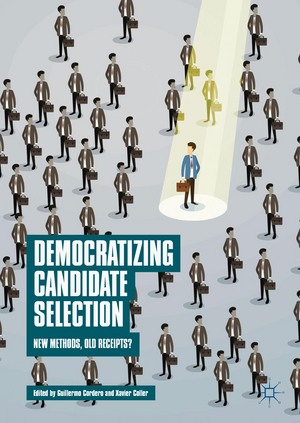Democratizing Candidate Selection: New Methods, Old Receipts?
Editat de Guillermo Cordero, Xavier Colleren Limba Engleză Hardback – 15 iul 2018
| Toate formatele și edițiile | Preț | Express |
|---|---|---|
| Paperback (1) | 779.57 lei 6-8 săpt. | |
| Springer International Publishing – 25 ian 2019 | 779.57 lei 6-8 săpt. | |
| Hardback (1) | 784.79 lei 6-8 săpt. | |
| Springer International Publishing – 15 iul 2018 | 784.79 lei 6-8 săpt. |
Preț: 784.79 lei
Preț vechi: 957.06 lei
-18% Nou
Puncte Express: 1177
Preț estimativ în valută:
150.17€ • 157.21$ • 124.26£
150.17€ • 157.21$ • 124.26£
Carte tipărită la comandă
Livrare economică 05-19 aprilie
Preluare comenzi: 021 569.72.76
Specificații
ISBN-13: 9783319765495
ISBN-10: 3319765493
Pagini: 336
Ilustrații: XX, 288 p. 20 illus.
Dimensiuni: 148 x 210 mm
Greutate: 0.52 kg
Ediția:1st ed. 2018
Editura: Springer International Publishing
Colecția Palgrave Macmillan
Locul publicării:Cham, Switzerland
ISBN-10: 3319765493
Pagini: 336
Ilustrații: XX, 288 p. 20 illus.
Dimensiuni: 148 x 210 mm
Greutate: 0.52 kg
Ediția:1st ed. 2018
Editura: Springer International Publishing
Colecția Palgrave Macmillan
Locul publicării:Cham, Switzerland
Cuprins
Notă biografică
Guillermo Cordero is Professor at the Universidad Autónoma de Madrid, Spain. His publications include a number of books, chapters and journal articles on candidate selection, electoral behaviour and political attitudes.
Xavier Coller is Professor of Sociology at the Universidad Pablo de Olavide, Spain. He has authored or co-authored over a hundred works on social theories, research methods, collective identities, political elites, and complex organizations.
Xavier Coller is Professor of Sociology at the Universidad Pablo de Olavide, Spain. He has authored or co-authored over a hundred works on social theories, research methods, collective identities, political elites, and complex organizations.
Textul de pe ultima copertă
This book studies the challenges to conventional politics posed by new ways of selecting candidates for legislative elections. The recent economic crisis had profound political consequences on politics, generating an upsurge in the demand for more participative ways of decision-making in politics channelled through social movements and individuals in different countries. Some parties have reacted by introducing changes in their internal organization (via intra-party democracy), particularly related to the selection of candidates for public office. This volume explores the trends and challenges of these new methods of selection, analyses how the internet is increasingly being used as a selection tool, and evaluates some of the relevant consequences related to political representation, party cohesion and party centralization, among others.
Caracteristici
Studies the emergence of new ways of selecting candidates for electoral ballots
Considers the impact of the economic crisis on disaffection, the emergence of new parties, and the new relevance of formerly minor parties
Addresses the surge of more participative ways of decision-making in politics channelled through social movements
Considers the impact of the economic crisis on disaffection, the emergence of new parties, and the new relevance of formerly minor parties
Addresses the surge of more participative ways of decision-making in politics channelled through social movements
